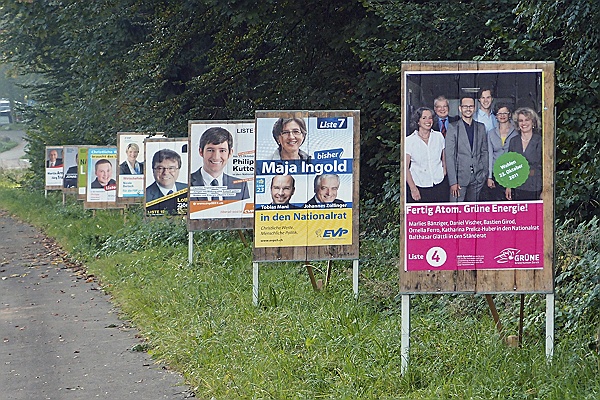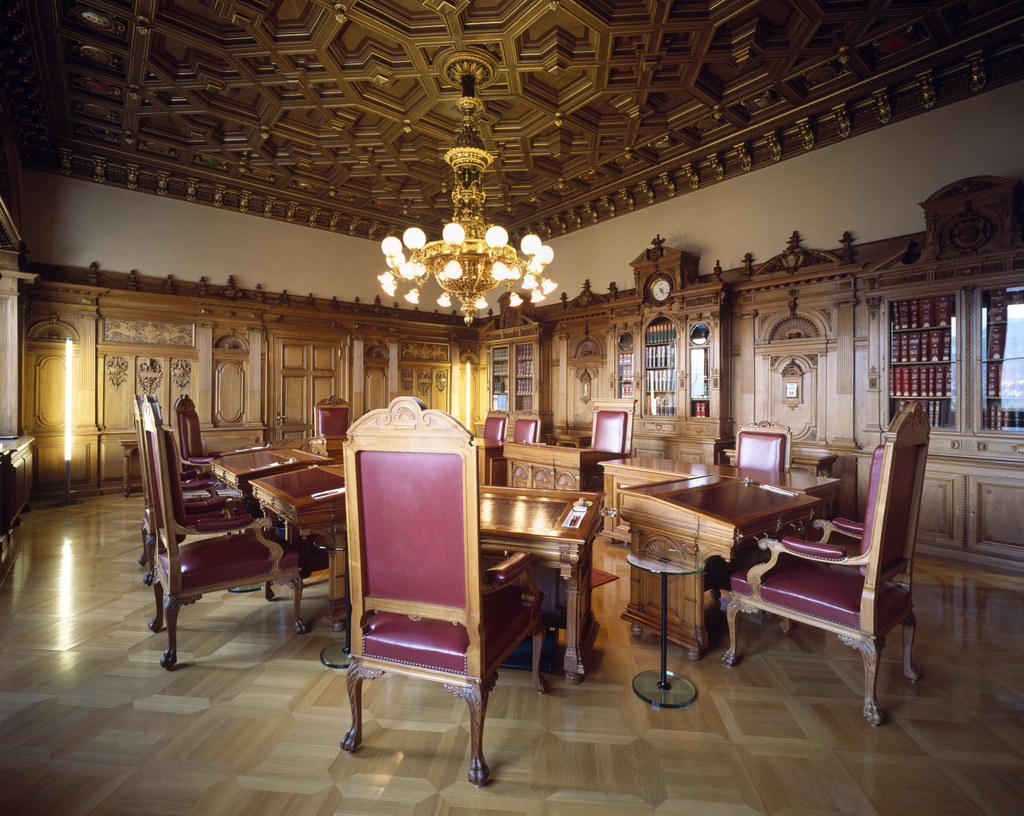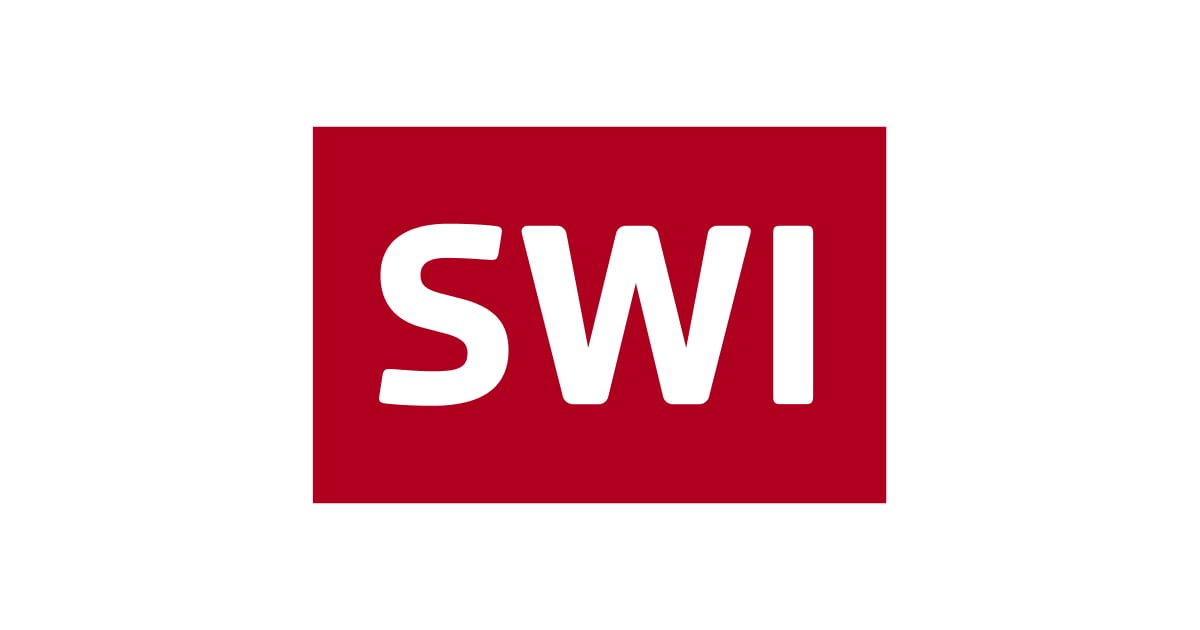Business lobby “as strong as before”

The results of the recent federal elections in Switzerland would suggest that the environmental lobby is getting stronger as the business lobby grows weaker.
Political expert and author Victor Parma disagrees. He considers the power of the Swiss Business Federation, economiesuisse unshakeable, although he sees a shift on the question of nuclear energy.
Public transport accounts for the largest lobby in parliament, thanks to its 30 representatives, despite the loss of five seats. There are now more people representing environmental organisations (+3 representatives) and energy transformation (+3), as well as development aid (+2) and the trade unions (+1).
On the losing side after the October 23 elections were the financial sector (-4 representatives), business associations (-3), the nuclear industry (-3), tourism (-2) and the automobile industry (-1).
“The big loser is the economy. Both banks and insurance companies, as well as large umbrella organisations including the Swiss Business Federation, the employers’ organisation and the trade association, have lost influence,” wrote the NZZ am Sonntag newspaper. Its analysis was echoed by other Swiss media outlets.
But Viktor Parma, who has 30 years of experience as a parliamentary journalist, disagrees.
One of 30 dossiers
“The Swiss Business Federation has not lost an inch of ground; it is still as strong as before,” Parma told swissinfo.ch.
In their recent book “Die käufliche Schweiz” (Buyable Switzerland), Parma and co-author Oswald Sigg (an ex-government spokesman), reveal how much power economiesuisse enjoys within parliament. For example, the book cites the detailed instructions the Swiss Business Federation issued to the 130 voting members of the trade and industry group, whose office leads the association.
The only “shifts in nuance” are in the question of the withdrawal from nuclear power, where the Business Federation could meet more opposition, in Parma’s view.
“But the Swiss Business Federation was never the nuclear lobby – the nuclear issue is merely one of about 30 dossiers led by the umbrella organisation,” Parma said.
The political expert interprets the Liberal Greens’ victory in the elections as a boost to environmental organisations and Swisscleantech, the industry association of sustainable technologies.
But Parma considers it “a bit far-fetched” to expect a more sustainable environmental policy for the next four years based on this shift of parliamentary strength. He considers last March’s disaster at the nuclear power plant in Fukushima, Japan, and its consequences more influential.
First impressions
Despite the bloodletting in the ranks of the nuclear lobby, Parma expects that those who have remained will continue to represent their interests inside parliament – a move Parma considers legitimate.
“It is important for parliamentarians to know who argues in favour of what and for which reasons,” he said, noting that this helps them to get an initial overview.
Parma does not believe that lobbying can improve the quality of political decisions – an argument often voiced by professional stakeholders.
“I doubt that lobbyists are more competent by definition. On the contrary: because they are by definition biased, they are to be taken less seriously in the political sense,” he said.
Neither does Parma support the argument that lobbyists are needed to help interpret difficult topics. Rather, he finds that the problem is that there are too many badly written and incomprehensible formal messages written to politicians and journalists.
For example, the July 2011 government paper on the adoption of a law to assist the tax office would have been hard even for tax experts to parse, according to Parma. His conclusion: “If it is written badly, then there is probably something hidden within. And the more incomprehensible, the easier it is for the lobbyists.”
Because the lobbying sector is characterised by confusion, Parma gave no estimates as to the number of stakeholders. However, he did define some categories.
Semi-state status
The Swiss Business Federation is at the top because it exercises its power at a macro level characterised by a variety of ways to influence: consultation drafts, consultations, pre-advisory council committees, council debates and finally, the voting campaigns.
Furthermore, the status of the federation is that of a semi-governmental organisation at the governmental level.
“If a foreign president visits Switzerland, the head of the Swiss Business Federation will hold highly official business talks with him,” said Parma.
Conversely, the umbrella organisation is a fixed component of the business delegations that often accompany Swiss government officials on their trips abroad.
At the second stage, according to Parma, are representatives of the rest of the economic and industry associations of major non-governmental organisations, from the health and culture sectors, and from regions of the nation. The two permanent visitor badges, which parliamentarians can give to anybody, often go to relatives, personal staff or remain unused, Parma said.
In addition to the parliamentarians themselves, Parma pointed out that there is another category that is usually not mentioned: accredited parliamentary journalists who work as lobbyists. These would certainly include Viktor Parma. When it comes to transparency inside parliament, he is one of the biggest lobbyists.
Every parliamentarian has two visitor badges to award to whomever they choose.
They entitle the holder to admission to the foyer of the parliamentary chambers.
Because the badges are much sought after, new parliamentarians are literally besieged by lobbyists for the “tickets”.
As a counter-offer, lobbyists offer to include members of parliament in advertising campaigns.
The guest list, which was previously only visible inside parliament, will be published online in mid-January 2012.
Policy proposals are prepared by 12 standing committees in the House of Representatives, and by 11 in the Senate.
Because crucial policy choices are made by the committees, the seats are usually highly coveted.
The number of seats allotted to a particular fraction is carefully calculated. The exact seat assignments are determined internally.
A shift in Swiss environmental policy therefore depends on the new composition of the Committee for the Environment, Spatial Planning and Energy.
Of particular importance, according to author Viktor Parma, is the question of whether the representatives of the Radical Party will be favour the environment or nuclear energy.
The new composition of the committee will be revealed on December 21.
(Translated from German by Susan Vogel-Misicka)

In compliance with the JTI standards
More: SWI swissinfo.ch certified by the Journalism Trust Initiative
















You can find an overview of ongoing debates with our journalists here . Please join us!
If you want to start a conversation about a topic raised in this article or want to report factual errors, email us at english@swissinfo.ch.